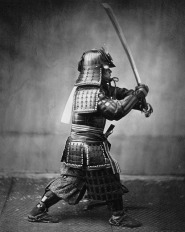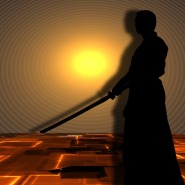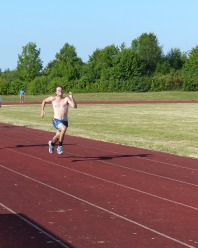A New Language For Creative People
A newspaper reviewer of my book Fighting To Win: Samurai Techniques For Your Work and Life thought that a unique feature of the book is that it exposes the reader to an exciting new vocabulary–Asian terms for self-improvement for which there are no Western equivalents. The book begins with an example of what the book is about: the application of the psychological and spiritual insights of the samurai, the most remarkable warriors ever to walk the earth, to the everyday lives of ordinary working people—the most magnificent people of all.
 It says: “The tramp of warriors sounded like a thousand convulsions of the earth. The shouts of warriors, the whistling of arrows, the thunder of the feet of foot soldiers and the hooves of chargers did not cease,” and tells the story of a sales woman who uses insights from the samurai Way to overcome her fear of an intimidating prospect and makes a sale.
It says: “The tramp of warriors sounded like a thousand convulsions of the earth. The shouts of warriors, the whistling of arrows, the thunder of the feet of foot soldiers and the hooves of chargers did not cease,” and tells the story of a sales woman who uses insights from the samurai Way to overcome her fear of an intimidating prospect and makes a sale.
I think it will be worthwhile to apply a select few of these terms to the lives of creative people–the Way of the artist, the Way of the writer, the Way of the composer, the architect, the performer–since so many creative people read my blog and the concepts will be so beneficial to them. As you read, think of the many applications there are to your creator’s life as so many people have.
Musha Shugyo: Samurai Training. Samurai were trained to fight in the service of a lord—with supreme self-confidence, courage, bravery, and superb  skill with weapons. Four things were especially important to samurai:
skill with weapons. Four things were especially important to samurai:
Duty—we must make good what we owe.
Self-Control—body, mind, spirit, emotions under control.
Commitment to Immediate Action—“The Way of the samurai is immediacy”—no delays.
Constant Self-Improvement—no resting on your laurels; always striving to do better; to develop your skills to the highest level you’re capable of. What creator is not trying to improve?
Ryuu: Dragons. For samurai warriors of feudal Japan all obstacles in a person’s mind, heart, and spirit were “dragons.” A creator’s dragons are no longer of the fire-breathing variety that scared him or her as a child. They’re  now a different species entirely, and to become all the creator you wish to become you will have to break completely free of them. When a samurai overcame a dragon he was “striking through the dragon’s mask.”
now a different species entirely, and to become all the creator you wish to become you will have to break completely free of them. When a samurai overcame a dragon he was “striking through the dragon’s mask.”
I arrived early at a conference room where I was to speak. Two men and a woman who’d come to hear me were early too and were at a table with their copies of Fighting To Win open. They seemed to be working hard and I asked “What are you working on?” The woman said, “We’re discussing our dragons.” The main dragons the samurai faced and creative people face too are:
Fear: Creative women and men experience fear most every day. The samurai set out to master fear, to learn to be no more ruffled whatever he was facing—however terrible–than “someone sitting down for breakfast.”
Being Afraid to Take Risks: The desire for certainty, the sure thing, often makes us cowards. There’s no room for sure things in a creator’s world. Samurai were taught that the greatest rewards lie one inch from the foe’s blade—edge in close, take a chance. Why aren’t we more confident and bolder?
Thinking Too Much: To be creatively free creators have to learn to think much less about what might go wrong.
Doubting Yourself: The creator’s most powerful dragon is dwelling again and again and again on his shortcomings, on what he lacks.
Hesitating: Wanting to do something but stopping.
Cowardice: The Chinese language permeates the Japanese language. The Chinese character for “cowardice” is composed of two symbols, “meaning” and “mind.” Creators are often finding too much meaning in things—he or she thinks too much—often worrying and fretting and dissipating their creative energy, that fuel creators need so much of. If you believe you’re thinking too much and that it’s driving you away from instead of to your work, this could be a dragon you’ll want to get rid of.
Try to make it a point to remember the term tomaranu kokoro. No small thing in samurai fighting, it has been called “the secret essence” of the samurai  Way. More important, it’s relevant to the Way of the Creator. It means “a mind that knows no stopping.” If you have ever seen a master swordsman in action, you’ve witnessed tomaranu kokoro. Without once stopping he attacks, feints, cuts, slashes, turns, leaps, spins, and thrusts in a whirlwind of action.
Way. More important, it’s relevant to the Way of the Creator. It means “a mind that knows no stopping.” If you have ever seen a master swordsman in action, you’ve witnessed tomaranu kokoro. Without once stopping he attacks, feints, cuts, slashes, turns, leaps, spins, and thrusts in a whirlwind of action.
The reason he is able to move so smoothly, effortlessly and quickly, his sword a blur, is that he is doing the same thing in his head. His body moves without stopping because his mind is tomaranu kokoro. His mind doesn’t stop to worry, to ask “what if”—“What if I lose?” “What if I die?”—or the creative person’s “What if I’m not good enough?” It doesn’t stop for anything. It keeps moving and facilitates the movement of his body. You can see that tomaranu kokoro is an ideal state of mind for the creator–an uninhibited, free, fluent, effortless yet focused mind and body.
Toraware—its opposite–means “caught,” and tomaru means “stopping” or “abiding.” You might want to remember them too, because they help explain why so many exceptionally talented creators are not as successful as they have the potential to be. It’s when your thoughts get caught (toraware) or stopped (tomaru) that you have trouble executing a creative action. It’s when your mind doesn’t flow from one idea to another but gets hooked or snagged on self-doubt or worry or anger, etc. that you are prevented from fully functioning creatively. Recall the last time you had problems with a painting, sculptor, story, composition, or performance and you were upset or troubled. It was because your thoughts got caught or stopped; they didn’t flow. You were all tied up—your mind, your body.
Whenever you find your thoughts getting caught or stopped, tell yourself to remember toraware, “caught,” and tomaru, “stopping.” More important, tell yourself to get back to tomaranu kokoro, the mind that knows no stopping, and return with confidence to your work. Let your mind be free to function according to its own natural free-flowing nature.
Fudoshin: The Skill of Making the Body Obey the Mind and Immovable Mind
Have you ever run in a marathon, felt pain, thought of stopping but refused to? If so, you’ve tasted fudoshin, immovable mind. No matter what you were  going through your mind wouldn’t budge from the goal of finishing. The samurai spoke of iwoa no mi, “rock body” and wanted his commitments to be as immovable as a mountain. Why not yours?
going through your mind wouldn’t budge from the goal of finishing. The samurai spoke of iwoa no mi, “rock body” and wanted his commitments to be as immovable as a mountain. Why not yours?
The skill of making the body obey the mind is this: going into action—getting your work done, being creative, thriving, reaching success in spite of your dragons. Not letting any dragon stop you. You needn’t go off to the top of a mountain to overcome a dragon. You can say, “OK fear, come along if you want. “ Self-doubt, hesitation, thinking too much—you can’t stop me.” “Come on, tag along. But you cannot stop me. I’ve got a story to write, an etching to complete, a performance to give, a career to manage.”
Every day in studios, work rooms, and theatres some creators are thinking: “In order to do it (whatever it is) I’ve got to first overcome my problem—my fear (or shyness, lack of self-confidence, bad habits, indecisiveness, etc.). Once I get rid of that baby, I’ll be all right. Then I’ll be able to create my great work.” The real problem isn’t what they think it is. It is not the fear or lack of confidence. It’s their belief that the fear has the power to prevent them from doing what they should be doing.
If the creator forgets about himself and his dragons completely and focuses only on adapting to what his creative life path requires of him, no dragon will ever stop him. The dragon has no right to stop you. But your mind must be immovable. Keep your mind focused on the task. Put negative emotions out of the equation.
*******
In my next post, Part II of this topic, I’ll discuss more samurai concepts creative people can apply to improve their work and lives.
© 2016 David J. Rogers
For my interview from the international teleconference with Ben Dean about Fighting to Win, click on the following link:
Order Fighting to Win: Samurai Techniques for Your Work and Life eBook by David J. Rogers
or
Order Waging Business Warfare: Lessons From the Military Masters in Achieving Competitive Superiority
or


Thanks for the ” High level concepts” David.
I will keep this phrase:
“Not letting any dragon stop you”.
Have a nice weekend.
LikeLike
Marilucas, Good hearing from you. I’m glad you liked the concepts. I like them too, and I too try to guard myself against dragons. Hope to see you one of these days.
LikeLike
Good morning David….For some reason I keep losing comments I make on your blog, and so I will try again.
This post is perfect timing for me….as I am giving a workshop in London this coming Wednesday based on the shapes and rhythms of Saorge (recently visited there) and the surrounding landscape.
To do this effectively, we will warm up….and then using key points from your book….i.e. ‘Not thinking too much – and not doubting ourselves’…we will hopefully move into a flow of work, where there is a total connection between our thought and what we produced without all the other intrusive feelings/thoughts getting in the way!
I will of course talk about you and the book, which I will take with me, and promote.
Meanwhile, I do hope that you and your family enjoy a beautiful Thanksgiving…janet:)
LikeLike
Hello Janet. I find I’m very pleased with myself this morning that I wrote something you find valuable for yourself and other artists. As you know, my focus is less the technical aspects of an art, but rather what I call artists’ “Inner Skills” that combine with technical abilities to help the artist fully realize his/her talents.
I’m flattered that you will be using ideas from my Fighting to Win and will be talking about me—me, can you imagine? Well, come to think of it, I talk about you and your beautiful artwork too. I’ll enjoy thinking about you and your workshop friends on Wednesday, and imagining you all striking through the dragon’s mask, then creating wonderful art. Let me suggest that you if you’re recommending the book you recommend the eBook since I updated it. Thanks for promoting it.
On Thanksgiving Thursday I will be together with friends, my wife Diana, my children and grandchildren. I will caution myself not to eat too much at that feast. But that will have no effect and I might have to loosen my belt.
I hope your work is all you want it to be and you find joy in it as you so obviously do.
LikeLike
Good morning, David…..thank you for this lovely comment. E book duly noted, and please do eat some turkey plus trimmings and pumpkin pie for me this Thursday. Enjoy a beautiful family gathering. janet:)
LikeLike
Thank you Janet. I hope your workshop is all you want it to be.
LikeLike
Good morning David, the workshop went exceptionally well. I am planning on doing a follow up blog based on what I talked about, including your ideas, etc. this coming week. Hope you are enjoying a lovely relaxing weekend….Janet:)
LikeLike
Janet, well that’s just great. I’m so happy the workshop went so exceptionally well. I take a wee bit of credit for its success since I was thinking about you all that day and sent out streams of good ki to you. I look forward to reading your blog and will be sure to get back to you. Thanksgiving weekend is winding down and my and Diana’s minds are turning back to work. I’m looking forward to that. I hope your weekend is going well too.
I want to be sure to tell you how generous it is of you to share your experience, knowledge, and talent with so many people through your workshops, your blogs, and your visits. There’s always the temptation for the artist to isolate and become reclusive, but you always find time to share and encourage others.
LikeLike
The ki was received:) There have been times in my life/career when all I wanted to do was isolate, but it seemed that providence would step in one way or t’other and not allow me to do so….which is good, because more and more I enjoy teaching. It’s always lovely to get back to a normal routine after a holiday….enjoy….Janet:)
LikeLike
I’m glad that Providence would step in and get you back on track and I”m sure many other people feel the same. Right now I’m in my work room listening to the latest Nobel Prize winner in literature–Bob Dylan.
LikeLike
I have so many memories of Bob Dylan…Enjoy:)
LikeLike